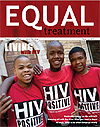Nokhwezi Hoboyi shares her story.
By Mara Kardas-Nelson
Nokhwezi Hoboyi is late. We were scheduled to meet at the University of the Witwatersrand at 4pm, but when I call her at 4:10, she still hasn't left the office. "I'm sorry," she says. "To be honest, I'm still packing my things up. I'll be there soon."
An hour later we finally find each other near the school's law faculty, where Nokhwezi is attending a course on legal aspects of HIV. The course is another addition to her already busy life, which includes being a young mother and district coordinator of TAC's Ekurhuleni office. She is small in stature, her thin body bursting with energy, her head neatly wrapped in a black scarf to match her long skirt, her shoulders held high. Despite rushing around, Nokhwezi appears calm, a woman who gives off the sense that she has all of her ducks in a row.
Photo by Samantha Reinders
Something is wrong
But Nokhwezi's life hasn't always been that orderly. Born and raised in Boksburg, Gauteng, Nokhwezi initially learned that something might be wrong with her health during her first pregnancy at age 18. "I went to the doctor… and he said he was going to do a series of blood tests…The results came back in an envelope that said 'confidential'…The doctor never told me the results, he just said they showed that I had a rare illness, and he was going to prescribe some tablets for me…I was admitted into a private hospital and given blue and white tablets, and I remember the nurses asking me if I knew what those tablets were for. I took that treatment for two weeks, and delivered my late son.
"My second child became ill at the age of two months, and when she was about four months the doctors wanted to test her for HIV…I gave consent, and the results came back positive."
"That was hard," says Nokhwezi, "because at that time there was not much information about HIV. All I knew was that Aids kills. One would see these horrible pictures of frail people with HIV on TV. I didn't know that there was treatment, I didn't know where one could find it…I did not know what was going on. My daughter passed away in October 2002, and I got tested…The results confirmed that I was HIV-positive."
Disclosing her status
It took Nokhwezi a while to tell anyone about her status. "…I did not share it with anyone, until I became very, very sick at the end of 2003. I then told my mom, and asked her to tell my other siblings.
"It was a tough year. There were questions: 'Why our baby sister?' And at times I would say, 'Why me?' And my mom said, 'If not you, then who? You just have to accept it and keep taking the treatment that was prescribed.' She nursed me, and I went through a phase of dementia."
'Life after testing positive'
"I joined TAC when I had full-blown AIDS," continues Nokhwezi. "I heard about the organisation at one of the hospices I was in. [A] nurse told me that her nephew was a member of TAC, and she said that there was life after testing positive for HIV. The nephew… invited me to a TAC branch meeting. On the very same day there was a treatment literacy presentation so I stayed for it, and afterwards I joined TAC! Eventually I became a treatment literacy volunteer, giving talks at local clinics and at the local hospital in conjunction with the antiretroviral (ARV) roll-out…I would often refer to my personal experience during these talks.
"In 2005, I attended a media training workshop in Cape Town, and became a community media practitioner. I moved to Cape Town to co-edit Equal Treatment with Nathan Geffen [and] eventually became the full-time editor of the magazine. While in Cape Town, I was very involved in helping to stop charlatan Matthias Rath from selling false 'AIDS remedies' to people living with HIV.
Resistance to ARVs
"While all this was happening, I was still quite sick; when I moved to Cape Town, my CD4 count was 3. It went up to 11, but through my treatment literacy training I realised that I may [have become] resistant to Efavirenz, the ARV I was taking. I think this happened because I had received no adherence counselling or discussion about ARVs when I was first prescribed them in 2002. When the doctor gave them to me, he didn't describe what they were for or that they were a lifelong treatment. So when I started feeling better, I stopped taking them... But then I became very sick by the end of 2003, and re-started my ARVs at the hospice.
"When I told my doctor that I thought I was resistant to Efavirenz in 2005, my regimen [changed] to 3TC, AZT and Caletra. After starting regimen two, my CD4 count went up and my viral load was undetectable."
For Nokhwezi, reflecting on her own experience with ARVs helps to demonstrate the importance of treatment literacy. "Being treatment-literate helps the patient understand what the drugs are doing in their body," she notes, "and how to identify signs and symptoms of resistance and opportunistic infections. This knowledge enables you to notify healthcare workers of any changes in your body."
'Longed to have a child'
With Nokhwezi’s CD4 count on the rise, she decided to try for another baby. "I so longed to have a child. After consulting my gynaecologist, I was able to follow some procedures and conceive…I gave birth to my son on 9 October 2007. It was not an easy pregnancy, he was born prematurely, but now he's one hyperactive little boy."
Nokhwezi's son is already on the path to becoming treatment-literate himself. "Although he is still very young, he has noticed that mommy takes pills at night and in the morning, and whenever he sees my pills, he says, 'Mommy, take your pills!' He knows that I have to do this, although he doesn't know why.
"Once he turns four and is able to understand, I will start reading to him from children's books on HIV. I want to be the one to explain the whole situation to him, before anyone [else does], so that he's able to deal with it. I've also kept a copy of his results from when he was six weeks and then six months old, so that I'll be able to say, 'Through taking my treatment I was able to protect you from the virus that I have' and encourage him to stay negative throughout his life."
'Live like anybody else'
"As you can see, HIV never stopped me," Nokhwezi continues. "I've taken it as a chronic illness, and managed to live my life like anybody else… I'm now super healthy, I go to the gym… My life is just blossoming, and I've continued the career plans that I had before I was diagnosed with HIV. In addition to working in the TAC Ekurheleni office since 2008, I've also been involved in many other civil society platforms, representing TAC [on the NGO sector] as well as … people living with HIV… I've been involved with Siyayinqoba Beat It! and a member of the South African National Aids Council Technical Task Team on Treatment, Care and Support."
Nokhwezi attributes her successes and good health to the care of her mother, sisters and brothers. "I would not have had this strength without the support of my family. When I was full-blown I had my mom as my pillar of strength. Unfortunately she passed away in 2006, just a year before I had my son. Even my nieces are now involved with their TAC branch."
Nokhwezi and I end our interview just minutes before her class is set to begin. Jo'burg is getting dark, a dim light settling on the Wits campus. Nokhwezi briefly shows me what's on the agenda for the evening course, a mix of legal jargon I do not understand. "I need to know about this in order to understand how to use the law," she says, smiling briefly, almost coyly. She hurriedly packs her bag, and rushes off into the building. Just one more thing to do before the day is done.
Read more:
Nokhwezi's disclosure tips
Nokhwezi on stigma and discrimination
Article reproduced courtesy of Equal Treatment – the HIV, TB and human rights magazine of the Treatment Action Campaign.




 Publications
Publications
 Partners
Partners
















